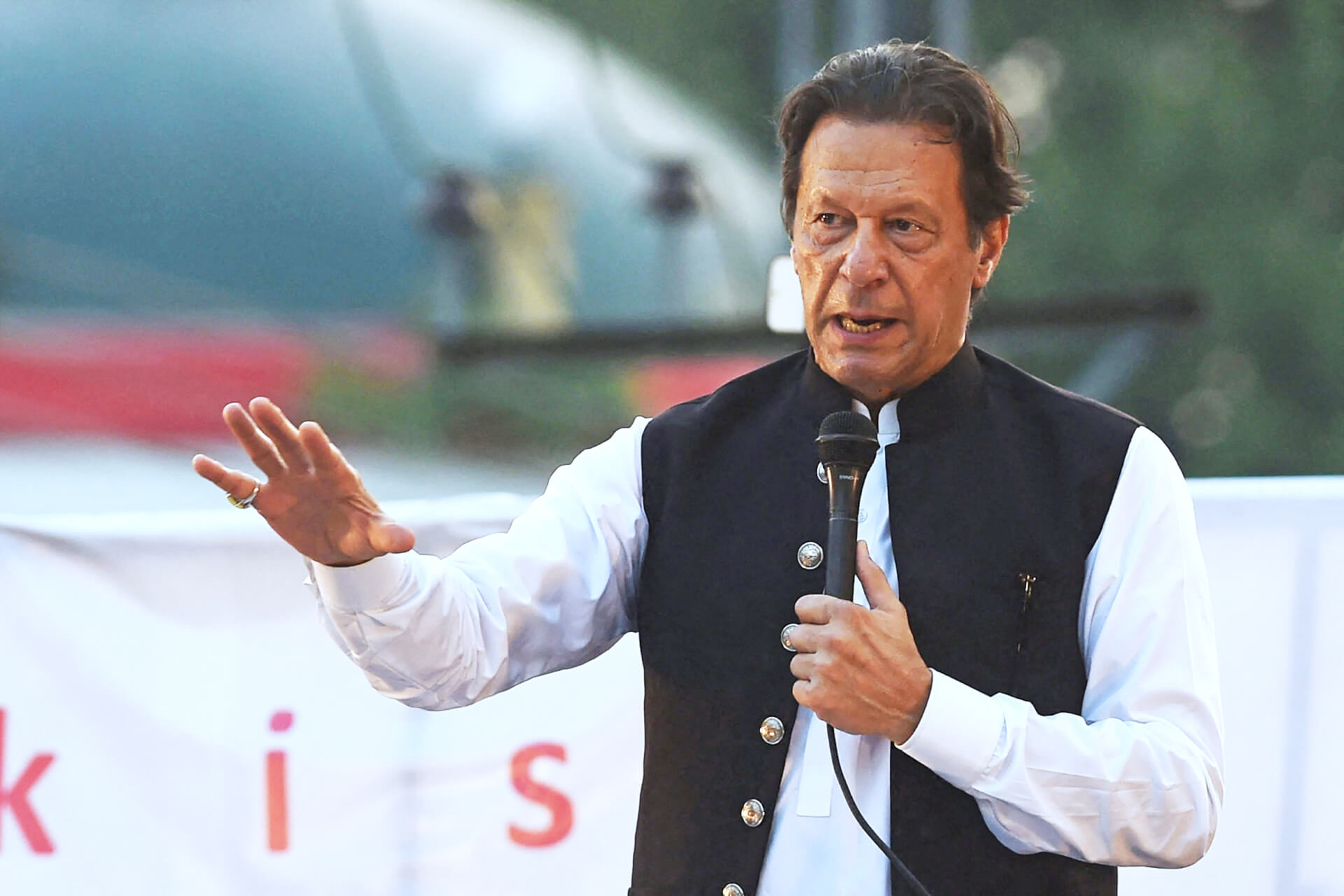Former Pakistani Prime Minister Imran Khan on Friday called the army and its Inter-Services Intelligence’s (ISI) claims that he had ‘begged’ them to keep him in power “foolish.”
Speaking to BBC Urdu, Khan rejected claims by ISI Director-General (DGISI) Nadeem Anjum and the director general of the Pakistani Army’s Inter-Services Public Relations, Lt. Gen. Babar Iftikhar, that he had offered a “lifetime extension” to Chief Qamar Javed Bajwa in March, declaring that his statement was “taken out of context.” He clarified that he did offer an extension but was rejected by Bajwa.
Without offering any more details on the allegation, Khan said that Anjum told “many lies and half of the truth” during his press conferences. He added, “Which side was the offer? In which context was I talking? If they tell the whole story, it will be very embarrassing for them all.”
India's real enemy, in today's changed circumstances, is not ISI but Imran Khan;Indian Establishment will do everything to make IK controversial. No one is more happy on removal of Imran Khan than Delhi Establishment. IQ 10-15 Brigade can't understand this but let's ignore idiots https://t.co/Inw77nrvgt
— Moeed Pirzada (@MoeedNj) October 28, 2022
Khan said it is “very sad” that the army had held such press conferences but assured that he has “point by point” responses for each of their allegations. He stressed, however, that he does not want to “embarrass” and damage the military institution, as that would weaken Pakistan and benefit the country’s “enemies.”
The former PM also criticised the ISI for applauding Bajwa despite being “a traitor.” Furthermore, he called for action to be taken regarding Senator Azam Swati’s claim of being tortured by two ISI officials.
Khan’s statement comes in response to a press conference by ISI Chief Anjum last Thursday in which he claimed that Khan had “begged” the establishment to save his government prior to his ouster in April, wherein he offered to indefinitely extend Bajwa’s tenure in exchange. Anjum alleged that Khan has only criticised the army for its perceived lack of ‘neutrality’ because “its chief refused to do [these] illegal or unconstitutional things.”
Anjum took aim at Khan’s hypocrisy by saying: “If the commander-in-chief is a traitor then why did you meet him in hiding? Meeting [him] is your right but it cannot be possible that you meet at night and call [him] a traitor in the day.”
He admitted that while the army does not hold such conferences regularly, this media event was deemed necessary in light of Khan’s harmful accusations, raising concern that the now-former PM’s “lies were not being declared lies.” In fact, Thursday’s press conference was the first time the ISI chief directly spoke to the media.
The sea of people along our March on the GT Road. For 6 months I have been witnessing a revolution taking over the country. Only question is will it be a soft one through the ballot box or a destructive one through bloodshed? pic.twitter.com/CeVdRVp9ON
— Imran Khan (@ImranKhanPTI) October 31, 2022
The ISI chief also addressed the death of Pakistani journalist Arshad Sharif in Kenya, calling him an “icon of journalism” whose family had served in the Army. He stressed that Khan had fed Sharif and other journalists a “false narrative” to defame the country and its institutions, after Khan claimed that the army could have been behind Sharif’s death.
This last week marked the latest episode in the war of words between Khan and the Pakistani army after he was removed from power via a no-confidence vote in April. Khan has called Gen. Bajwa “an animal” and a “traitor,” alleging that the army chief was responsible for, or at least complicit in, his ouster.
In this regard, Ifthikar replied last week by saying, “Lies were propagated and a narrative was crafted presenting the vote of no-confidence - a political, constitutional, and legal matter – as regime change operation, besides maligning the institution.”
Meanwhile, on Friday, Khan launched a “long march” from Lahore to Islamabad to reiterate his call for fresh elections and “make Pakistan free.” The march further intends to amplify Khan’s claim that the incumbent government is seeking to replace Bajwa, who is set to retire at the end of next month, with a more “malleable army chief.”
The government has warned that it will deploy armed paramilitary forces and use force against Khan’s supporters if they deviate from their predetermined route. In response, Khan has assured that the march would not enter the “Red Zone,” which houses critical government buildings.
During the march on Friday, he clarified that the then-opposition coalition was afraid of Lieutenant General Faiz Hameed replacing Bajwa, as it would have jeopardised their chances of returning to power.
Shocked & deeply saddened by the terrible accident that led to the death of Channel 5 reporter Sadaf Naeem during our March today. I have no words to express my sorrow. My prayers & condolences go to the family at this tragic time. We have cancelled our March for today.
— Imran Khan (@ImranKhanPTI) October 30, 2022
He accused the incumbent Sharif government of acting as “facilitators and handlers” of foreign governments and assured that the country would never accept “thieves.”
The march was halted for a day on Sunday after a journalist died after a journalist, Sadaf Naeem, was crushed under a container during the rally.
Pakistan has been subject to military rule for over half of its 75 years of independence, making the ISI an extremely powerful institution. Experts have often criticised the overarching role played by the army in decision-making, even with democratically elected governments in place.
In fact, reports suggest that Khan’s rise to power was also facilitated by the ISI, which allegedly pressurised political candidates to join his Pakistan Tehreek-e-Insaaf party. However, relations between Khan and ISI soured after he sought to replace Bajwa as the army chief.

